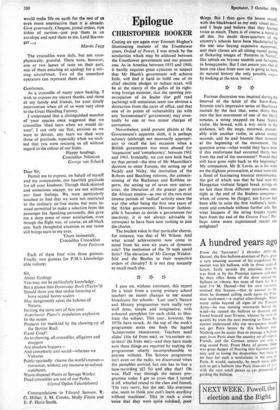Epilogue
CHRISTOPHER BOOKER
Casting an eye again over Emmett Hughes's illuminating memoir of the Eisenhower years, Ordeal of Power, I was struck by the similarities which may be adduced between the Eisenhower government and our present one. As in America between 1952 and 1960, it hardly requires great cynicism to suspect that Mr Heath's government will achieve little, will find it hard to fulfil one of its chief election pledges to reduce taxes, will be at the mercy of the gaffes of its right- wing foreign minister, that the sporting pre- occupation of its leader (for golf read yachting) will sometimes seem too obvious a distraction from the cares of office, and that one of its points of vulnerability (as with any 'businessman's' government) may even- tually be one or two minor charges of corruption.
Nevertheless, amid present plaints at the Government's apparent sloth, it is perhaps salutary (although not necessarily appropri- ate) to recall the last occasion when a British government was most abused for 'stagnation' and 'complacency', between 1961 and 1963. Ironically, we can now look back on that period—the time of Mr Macmillan's decision to enter Europe, the setting up of Neddy and Nicky, the institution of the Robens and Beeching reforms, the commis- sioning of the Buchanan and Robbins re- ports, the setting up of seven new univer- sities, the liberation of the greater part of the African empire—as one of the two most intense periods of 'radical' activity since the war (the other being the first two years of the Attlee government). However fashion- able it becomes to deride a government for inactivity, it is not always advisable in retrospect to have been seen rushing to join the chorus.
The loudest voice in that particular chorus, for instance, was that of Mr Wilson. And what actual achievements now come to mind from his own six years of dynamic rule? The institution of the 70 mph speed limit? The elevation of Mr George Weiden- feld and the Beatles to their respective orders of chivalry? It is not easy instantly to recall much else.
* * * I pass on, without comment, this report (in a letter from a young primary school teacher) on recent changes in BBC sound broadcasts for schools: 'Last year's Nature and History programmes were really very well done, simple and imaginative, with coloured pamphlets for each child, to illus- trate the subject. This year, however, the 1970s have struck. At the top of the week's programme notes one finds the legend `RADIOVISION PROGRAMME. Teachers need slides' (10s 6d from BBC), or 'FILMSTRIP RE- QUIRED' (8s from BBC)—and they have made sure these things are required by making the programmes utterly incomprehensible to anyone without. The Science programme isn't even on the radio, we discovered when the pamphlet arrived, but one has to buy a tape-recording (£2 5s) and play that! Oh woe. Half way through the nature pro- gramme today I got so cross that I turned it off, wheeled round to the class and fumed, `I'm very sorry, but the sec. like everyone else, seem to think you can't learn anything without machines'. This in such a cross voice that they were quite subdued, poor things. But I then gave the lesson myself, with the blackboard as my only visual aid-- and I hope and believe that they learned twice as much. There is of course a moral in all this. No doubt three-quarters of the country's schools have been blackmailed by the BBC into buying expensive equipment, and their classes are all sitting round gazing at flickering images of 'Patterns in Nature', like spirals on bryony tendrils and hexagons in honeycombs. But I can assure you that at least one class from now on is going to learn its natural history the only possible way-- by looking at the REAL mum'.
* * * Furious discussion was inspired during the interval of the latest of the Stern-Rose- Istomin trio's impressive series of Beethoven recitals by the fact that, some thirty bars into the last movement of one of the Op.12 sonatas, a string snapped on Isaac Stern's violin. He bowed, with a wry smile to the audience, left the stage, returned, preium- ably with another violin, in about twenty seconds, and he and Istomin then resumed at the beginning of the movement. The question arose—what would they have done if this misfortune had occurred thirty bars from the end of the movement? Would they still have gone right back to the beginning? My companion, Mr B. Levin, as is his wont on the slightest provocation, at once went into a flood of fascinating musical reminiscence, the gist of which was that he had seen the Hungarian violinist Szigeti break strings on no less than three different occasions, once
right at the end of the Brahms concerto— when, of course, he (Szigeti, not Levin) had been able to seize the first violinist's instru- ment and conclude without further ado. But what happens if the string breaks twenty
bars from the end of the Grosse Fuge7 Per- haps some more experienced reader can
enlighten? .






































 Previous page
Previous page